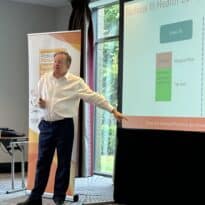Registration of Lasting Powers of Attorney have fallen significantly during the Covid crisis. Klara Kronbergs, Payne Hicks Beach looks at the trend and the importance, practicalities and digitalisation of the LPA.
It has been reported that there was a 30 percent drop in the number of LPAs registered between April 2020 and February 2021, compared to the same period the previous year – evidencing the impact of the pandemic. While this has since picked up pace, the number of LPAs being registered is still well below pre-pandemic levels.
LPAs are important documents: they enable donors to delegate significant decisions, be they financial or health and care-related, to trusted individuals, often family members. This can provide peace of mind, particularly if there is concern over the management of a person’s affairs, should they lose capacity. In the current unprecedented health crisis it is arguably more crucial than ever that LPAs are considered and implemented, especially for the vulnerable.
Reasons for the drop in LPA registrations include the difficulty in obtaining ‘wet’ signatures and arranging witnessing, plus increased OPG registration times. However, with careful planning, these need not be deterrents.
Practical steps
Whilst LPAs are created via an online form, which can initially appear simple, these are powerful legal documents and a solicitor should be involved at the outset to ensure that the donor appreciates the LPA’s significance and receives proper advice.
With rapid changes to people’s health occurring more so than ever with COVID, if there is any concern over a person’s fitness or capacity, LPAs should be explored and entered into without delay. Once a donor loses capacity, it is no longer possible for them to make an LPA and alternatives, e.g. deputyships, which are more costly and time-consuming, apply instead.
If a donor shows early signs of losing capacity, they may still create LPAs, provided they have lucid spells and can understand the actions they are taking. In such cases, a medical professional who can attest to the donor’s mental fitness should act as certificate provider. Once completed, an LPA should be registered promptly with the OPG, as without registration, an LPA lacks legal effect.
Communication is key in the LPA process. Early on, donors should discuss this with their attorneys and certificate provider and receive comprehensive advice, including on the more complex aspects of LPAs; e.g. instructions authorising the attorneys to engage investment managers and, where appropriate, clearing the wording with the relevant investment firm.
Multiple parties – including the donor, attorney(s) and their witnesses – must sign the LPA in a strict order. This can lead to confusion and delays, especially where several attorneys are involved and it is not possible to get all parties together for signature, requiring LPAs to be circulated by post.
However, giving clients clear signing instructions at the outset, plus ensuring that they brief their attorneys and certificate providers to expect the LPAs and line up witnesses saves time and potential crossed wires. Reassuring clients that witnesses need not breach the 2 metre distancing rule and that these can be persons who they are more likely to encounter in daily lockdown life – e.g. a neighbour – can also dispel concern.
With limited social gatherings now permitted, family reunions may be a good opportunity to get LPAs signed or handover LPAs for signature, avoiding the postal route. The ability to meet again with clients in certain circumstances can also ensure correct and efficient obtaining of signatures and witnessing, although this is currently only likely to be possible in specific cases.
Whilst maybe obvious, double-checking LPAs are both drafted and signed correctly before submission to the OPG also prevents delays (historically, 1/5 LPAs contained errors; this may lead to OPG queries or worse, a refusal to register).
The OPG recommends that registration fees be paid by card, rather than cheque, to save administrative time. Currently, they advertise a 12 week processing time (this was 8 -10 weeks pre-COVID).
Digitalisation
COVID has also reignited the debate on whether LPAs should be made fully digital (following an initial 2013 OPG consultation). In July 2020, the OPG launched their ‘Use a LPA’ service, which allows donors and attorneys to give organisations access to an online summary of an LPA, ostensibly avoiding the need to request certified copy LPAs.
However, there are widespread concerns over whether fully digitalising LPAs will lead to abuse:
- Where no ‘wet’ signatures are required, it may be difficult to ensure that the correct party is giving authorisation and detect where a vulnerable party is being induced into making an LPA.
- Digitalising LPAs makes it easier for persons to create LPAs without obtaining the necessary legal advice or fully understanding the document’s implications.
- Many people in the UK either lack basic IT skills or are without computer access, with the elderly – for whom LPAs may be the most relevant – being more likely to fall within these groups.
Whilst there are advantages, including the OPG processing applications faster and for a smaller fee, the legal profession remains cautious. With safeguarding the vulnerable a key priority for the OPG, implementing a system which arguably undermines this, may not in reality occur. That said, given LPAs are often considered in times of deteriorating health, the current process (which regularly takes 6 months) is far from satisfactory and there are good reasons to revisit this.





























